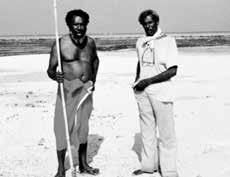
3 minute read
The flaw in Mabo and the issue of sovereignty by Life Member, Louis Coutts
The flaw in Mabo and the issue of sovereignty
By Life Member, Louis Coutts
Advertisement
Louis is an Honorary Life Member of International Commission of Jurists Victoria and a lawyer of many years standing. Also, a Life member of The Graduate Union, Mr Louis A. Coutts contributes regularly to our newsletter publications. He recently conducted a lengthly research into the issue of sovereignty and shares the outcome of his research below.
The thirtieth anniversary of the decision of the High Court in the Mabo case, recognising Native Title, has been celebrated as though it was the final and official expurgation of the crimes committed in this country against the indigenous population over the past two hundred years. It was nothing of the sort and in fact constructed an impenetrable legal fortress around the one principle that is the fundamental grievance of the descendants of the original occupiers of this county. That is the issue of sovereignty. The refusal of the High Court to permit the Aboriginal people to challenge the legality of sovereignty was an essential step in firstly enabling the Court to recognise Native Title and secondly to establish that because sovereignty vested in the Crown after Captain Cook’s proclamation in 1770, the Crown had the right to dispossess the indigenous people of their land. In the words of Brennan J “Native Title has been washed away by the tide of history”. The fact that the High Court refused to permit the indigenous people from challenging the validity of sovereignty is a get out of gaol pass to keep that genie locked in the bottle. In 1979 an Aborigine by the name of Coe applied to the Court in a challenge to the validity of the proclamation of sovereignty only to be told ty by the Court that he couldn’t argue the case in our Courts. In Mabo, the High Court followed that decision and thus enabled it to justify the dispossession that has taken place over the past two hundred years on the grounds that the dispossession was the right of the sovereign.. I cannot believe that legal scholars have overlooked the fact that this decision to prevent the challenge of sovereignty has no foundation in law. It is based upon a doctrine established in a scandalous decision of the Privy Council in 1791 in which it legitimised the pillage of the wealth of the Nabob of Carnatic without giving him the opportunity to argue his case. The Privy Council came up with the principle that issues arising out of a treaty between two sovereign people cannot be adjudicated in an English Court. Such a treaty is said to be an Act of State. But here is the rub. For an Act of State to operate to deny a party access to justice in an English Court, there must be a treaty between two sovereign people. Accordingly, to claim that an Act of State deprived the Aboriginal people from challenging the validity of sovereignty in our Courts it would be necessary to establish that they are sovereign people, not to mention the necessity for a treaty. The very refusal to allow them to challenge sovereignty would need to be based on an admission of sovereignty. No wonder the High Court won’t let them argue the case because it would then have to adjudicate on the validity of sovereignty which is precisely what the Aboriginal people want to establish. It is also interesting that in 1970, the High Court in England refused to follow the decisions upon which the High Court relied in refusing the indigenous people the right to challenge sovereignty.. So, was the proclamation of sovereignty by Captain Cook and others legal? In 1770, the laws of England and International law provided that sovereignty could only pass to an occupier of territory if the land was unoccupied, obtained by conquest or by treaty. In the event of conquest, the laws of the conquered continued until altered by Parliament (but as the land was said to be unoccupied, it could not be conquered). Thus emerged the scandalous doctrine of “Terra Nullius” which was enshrined in our Constitution until 1967. So, in 1770 and again in 1788, this land was occupied by an ancient civilisation, there was no treaty and it certainly was not conquered. Perhaps this makes it clearer why the High Court clings desperately to discredited legal theory to prevent the Aboriginal people from challenging the validity of sovereignty. Once it is established that sovereignty never passed to the Crown in 1770 or 1788, the argument that the Crown had a sovereign right to dispossess the then ancient occupiers of this land collapses.









